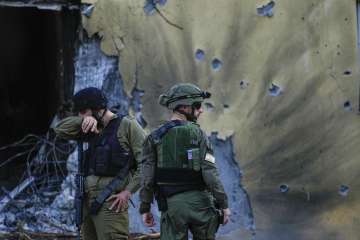As the devastating Israel-Hamas war killed thousands of people on both sides, the head of Israel’s Shin Bet security service, on Monday, took responsibility for the bloody rampage.
In a message sent to Shin Bet workers and their families over the weekend, Ronen Bar, director of the Israel Security Agency since 13 October 2021, wrote that “despite a number of actions we took, unfortunately, on Saturday, we were unable to create enough early warning to prevent the attack.”
“As the person at the head of the organisation, the responsibility for that is on me. There will be time for investigation — now is a time for war," he said.
The Shin Bet leads Israel’s efforts to track and monitor Palestinian militants. The Israeli news site Ynet has reported that on the eve of the attack, Bar was summoned to the office because of abnormal activity detected in Gaza. However, officials believed that only a limited attack would take place, according to the report.
Why Hamas is carrying out brutal attacks on Israel?
Hamas has always espoused violence as a means to liberate occupied Palestinian territories and has called for the annihilation of Israel.
Hamas has carried out suicide bombings and over the years fired tens of thousands of increasingly powerful rockets from Gaza into Israel. It also established a network of tunnels running from Gaza to Egypt to smuggle in weapons, as well as attack tunnels burrowing into Israel.
In recent years, Hamas had appeared to be more focused on running Gaza than attacking Israel.
What happened in recent times?
In recent years, Israel has made peace deals with Arab countries without having to make concessions in its conflict with the Palestinians. The US has recently been trying to broker a deal between Israel and Saudi Arabia, a bitter rival of Hamas’ Iranian backers.
Meanwhile, Israel’s new far-right government was working to cement Israeli settlements in the West Bank despite Palestinian opposition.
Hamas leaders say an Israeli crackdown on militants in the West Bank, continued construction of settlements — which the international community considers to be illegal — thousands of prisoners in Israeli jails, and its ongoing blockade of Gaza pushed it to attack.
Its leaders say hundreds of its 40,000 fighters took part in the assault. Israel says the group has about 30,000 fighters and an arsenal of rockets, including some with a range of about 250 kilometres, and unmanned drones.
What's next?
Israel and Hamas have fought four wars and exchanged fire numerous times since the Islamic militant group seized control of Gaza from forces loyal to the Palestinian Authority in 2007. Cease-fires have stopped major fighting in past rounds of conflict but have always proven shaky.
Each agreement in the past has offered a period of calm, but the deeper, underlying issues of the conflict are rarely addressed and set the stage for the next round of airstrikes and rockets.
With its increased leverage in this round, Hamas is likely to push harder for concessions on key issues, such as easing the blockade and winning the release of prisoners held by Israel.
Also Read: What is Hamas? How did it overwhelm Israel's robust intelligence agencies in its deadliest attack?
Latest World News
